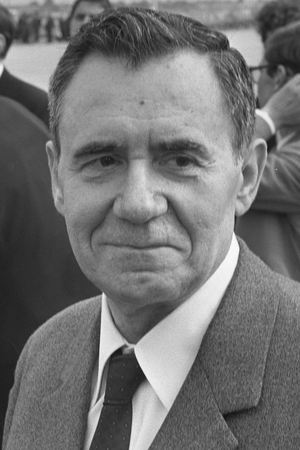Andrei Gromyko (1909-1989)
Alias:
Andrey Gromyko
Андрей Громыко
Birthplace:
Starye Gromyki, Mogilevskaya Governorate, Russian Empire
Born:
July 18, 1909
Died:
July 2, 1989
Soviet diplomat and statesman, in 1957-1985 - Minister of Foreign Affairs of the USSR, in 1985-1988 - Chairman of the Presidium of the Supreme Soviet of the USSR. Doctor of Economics (1956). In 1944, the USSR Ambassador to the United States, Gromyko, led the Soviet delegation at the International Conference at Dumbarton Oaks, Washington, USA, on the creation of the United Nations. Participated in the preparation of the Tehran conference, preparation and conduct of the Yalta conference, Crimea, USSR (1945), the conference in Potsdam (1945). In the same year, he led a delegation that signed the UN Charter on behalf of the USSR at a conference in San Francisco, USA. Gromyko was a member of, and then headed, state delegations of the USSR at 22 sessions of the UN General Assembly. Since the late 1940s, in the interests of the USSR, Gromyko has used the veto right in the UN Security Council more than 20 times, as a result of which he first received the nickname "Mister No" in the diplomatic environment and then in the press. Being a supporter of peaceful relations between the USSR and the United States and their NATO partners - Western European states, Gromyko, on behalf of the Soviet government, proposed more than 100 initiatives in the field of disarmament, his role during the lowest point of Soviet-American relations - the Caribbean crisis - is the subject of scientific and historical discussions. Gromyko put forward the initiative to conclude a Treaty Banning Nuclear Weapon Tests in Three Environments (1963), in January 1966, together with A. N. Kosygin, he held negotiations that prevented a war between India and Pakistan. With the participation of Gromyko, the Treaty on the Non-Proliferation of Nuclear Weapons (1968), the Moscow Treaty between the USSR and the Federal Republic of Germany (1970), the Treaty on the Limitation of ABM Systems (1972), the Treaty on Principles of Relations between the USSR and the United States (1972), the Treaty on the Prevention of nuclear war (1973), Strategic Arms Limitation Treaties in 1972 and 1979. Final Act of the Conference on Security and Cooperation in Europe (1975). At the same time, in 1968, Gromyko supported the introduction of Warsaw Pact troops into Czechoslovakia and the suppression of the "Prague Spring", and in 1979 he was part of a narrow circle of top state leaders who decided to send Soviet troops into Afghanistan. Gromyko was one of the closest associates of the long-standing Soviet communist leader Leonid Brezhnev. Gromyko held the post of head of Soviet diplomacy for 28 years, which is a record for the USSR and the Russian Federation. In March 1985, at a meeting of the Politburo of the CPSU Central Committee in Moscow, he nominated Mikhail Gorbachev for the post of head of the Communist Party of the Soviet Union. He completed his political career in 1988 as Chairman of the Presidium of the Supreme Soviet of the USSR - the formal head of the Soviet state. The motto of Gromyko's entire diplomatic activity is “Better 10 years of negotiations than one day of war”. According to Russian Foreign Minister Sergei Lavrov, Gromyko was "a great diplomat of the Soviet era."





